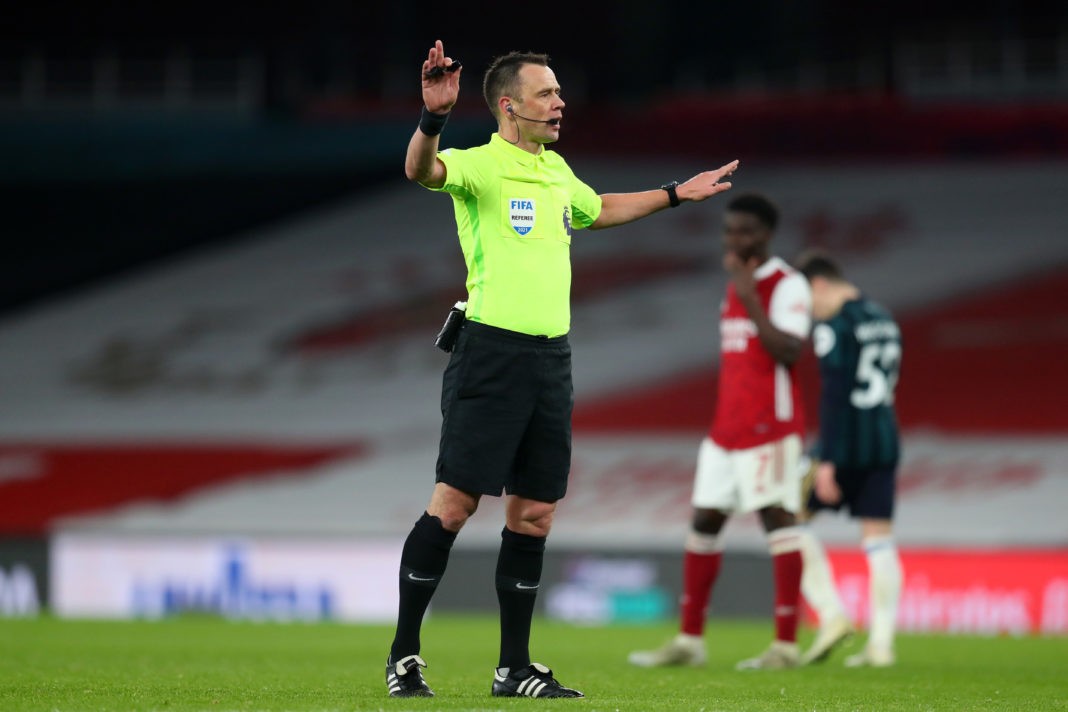Arsenal fans are well aware that this hasn’t been a great season when it comes to the decisions of referees and VAR decisions overturned in their favour, but it’s possibly been worse than they thought.
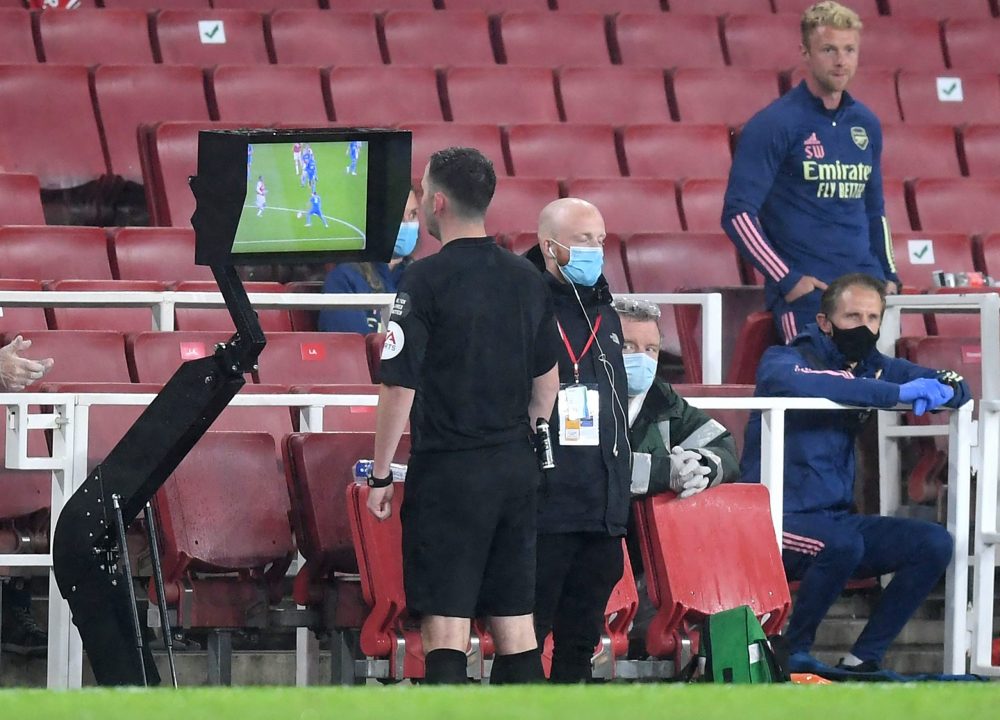
VAR robs Arsenal again as rules state it was a penalty
Keep reading for Why Saka should’ve had 2 penalties vs Leeds
Riding high once again at the top of the yellow card table, despite committing fewer fouls than most, Arsenal have the most red cards by a distance.
Of course, it helps when different rules seem to apply to different teams.
Take this weekend, for instance.
Bukayo Saka won two penalties and both were given, although his first was overturned by Andre Marriner on VAR.
It was a penalty, soft maybe, but still a foul and we see them given on a regular basis to other sides. At the time, I noted how he had recently had an even more blatant, but similar, appeal turned down so wasn’t surprised to see his first penalty against Leeds taken away.
It was, however, far from a ‘clear and obvious error’.
His next penalty saw the keeper take him out in the box when he was in a clear goalscoring position. Was the keeper booked like the laws say he should be? He was not, which kind of makes a mockery of the claims that the officials ‘had no choice’ but to send David Luiz off against Wolves when the Wolves forward grazed Luiz’s knee with his studs as he went to shoot.
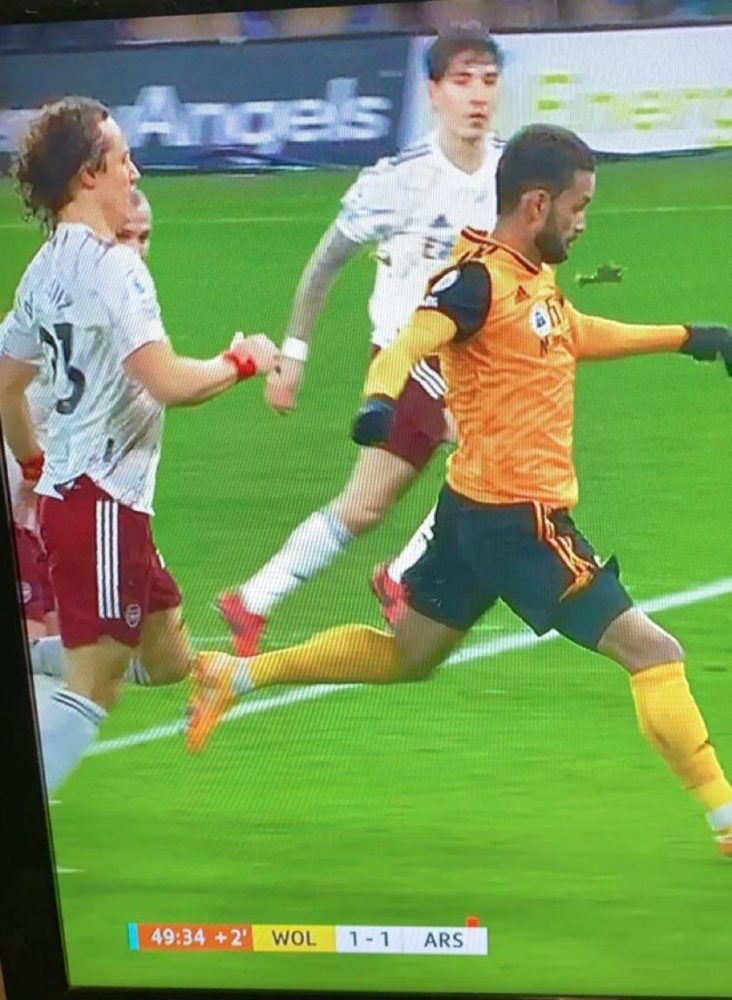
All those small decisions add up, like death by a thousand cuts. Not all the decisions that have gone against Arsenal, however, have been small and insubstantial. See the David Luiz example, for instance.
VAR overturns are not a level playing field
When it comes to having VAR do you a favour and correct a decision to your benefit, it is very clearly not an even playing field.
Just like last season, when Liverpool needed around twice the number of fouls to see a card as Arsenal did, so it is this season with VAR.
The average VAR decisions in your favour if you are Arsenal, Man United, Chelsea, Liverpool, Tottenham, or Manchester City should be around 4.1.
That figure is obtained how you usually work out an average – take all the individual numbers and divide by the number of teams.
Manchester City have had three decisions overturned in their favour by VAR. That’s a little lower than the average but nothing that would raise an eyebrow.
Spurs are right on the money with four.
Liverpool and Chelsea are a little ahead of the curve with five going in their favour but, as with City being a little under, a little over isn’t a big deal.
That leaves Arsenal and Manchester United.
VAR has overturned a decision in favour of Manchester United an incredible seven times, but that isn’t the worst bit.
When it comes to Arsenal, Mikel Arteta’s side have benefitted from one call.
One.
No PL ‘Big Six’ side has had more VAR decisions overturned in their favour than Man United this season. pic.twitter.com/A4rBLtpU9i
— ESPN FC (@ESPNFC) February 15, 2021
You could say the difference in the number is down to the quantity of reviews being asked for and you might be on to something. United games have seen 15 reviews while Arsenal’s have only seen six. What’s that about?
I can hear you in the back… It’s a small sample, spread it out across the league and you’ll get different figures.
Ok, let’s do that.
This season in the Premier League there have been 82 overturned decisions. You don’t even need a calculator to do the math here. What’s 82 divided by the 20 teams in the Premier League to give you the average?
That’s right, 4.1.
Have a cookie.
VAR overturns overall
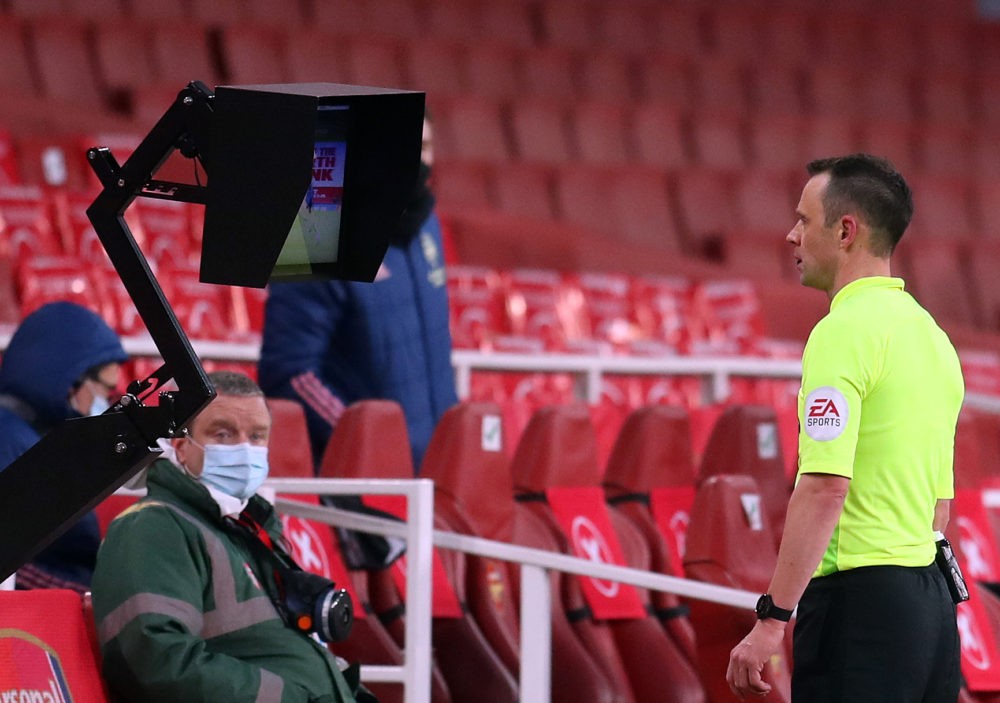
When overall decisions are taken into account, Arsenal have a score of minus four for the season. Only Liverpool, with minus five, have a worse record, but their games have seen 14 decisions sent to VAR and overturned, many more than we’ve had in Arsenal games.
There have been six decisions overturned by VAR in Arsenal games this season. One disallowed an Arsenal goal (Saka’s goal vs Wolves as Lacazette was offside), one ruled out an Arsenal penalty (v Leeds), one awarded Chelsea a goal, one sent off Granit Xhaka against Burnley and another sent off Nicolas Pepe against Leeds.
The only decision in our favour all season was the Aston Villa goal that was disallowed back in November.
One decision in our favour, five against.
VAR decisions overturned (NET SCORE)
- Chelsea +3
- Everton +3
- Brighton & Hove Albion +2
- Burnley +2
- Leeds +2
- Manchester City +1
- Newcastle +1
- Sheffield United +1
- Southampton +1
- Aston Villa 0
- Crystal Palace 0
- Fulham 0
- Leicester City 0
- Manchester United 0
- West Ham 0
- Wolves -1
- Tottenham Hotspur -2
- Arsenal -4
- West Brom -4
- Liverpool -5
Why Bukayo Saka should’ve had 2 penalties vs Leeds
by Dan Critchlow
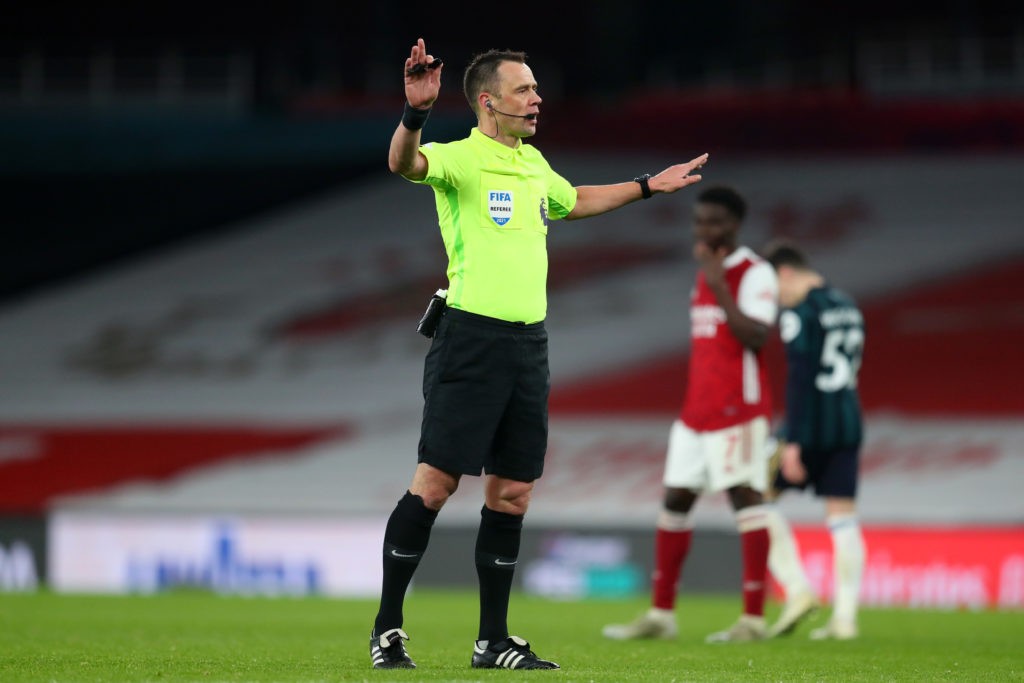
Bukayo Saka should have had two penalties against Leeds United on Sunday, and the first being overturned made a mockery of the “clear and obvious” rule.
Far from the first time this season, Bukayo Saka ran riot against Leeds United at the weekend. He was awarded two penalties and played a big part in another goal as Arsenal raced into a deserved 3-0 lead by half-time.
Yet the first of those penalties was incorrectly overturned. Whilst there was contact from Liam Cooper on Saka’s leg to trip him up, the VAR replays shown to the referee weren’t from the correct angle to see it.
As a result – with the referee understandably failing to spot the trip – he decided to overrule the penalty decision.
On the surface of it, that makes sense. If the referee sees a heavy challenge from Cooper but can’t see a trip, the decision becomes more subjective. Did Cooper really push him to the floor, or did Saka make the most of minimal contact?
But what really grinds me gears is that it’s just not a “clear and obvious” error to award the penalty.
Remember that the referee isn’t being asked to judge whether it should be a penalty, he’s being asked to judge whether he made a clear-and-obvious error in awarding one. That’s a crucial distinction.
You can watch the replay 20 times from the angles the referee saw and easily argue one way or the other. It’s not clear, so why has he overturned it?
We were told that VAR wasn’t brought in to re-referee matches, but simply to correct clear-and-obvious errors. In what sense does Saka’s penalty decision qualify, even if you can’t see the trip?

The reason we don’t want matches re-refereed by video officials is because of situations exactly like this. The referee has judged the situation correctly, then had doubt put into his mind, been shown unclear replays, and then switched to the wrong decision.
VAR’s influence, in this case, has been to take a good piece of refereeing and turn it into a bad one.
If you can’t tell for sure, if it’s not a clear dive or a clear trip, you shouldn’t be overturning the penalty. That’s not VAR’s remit.
The referee failed to apply the rules correctly. The VAR officials failed to provide him with the correct information to make the decision. Saka was robbed of a penalty he’d earned. We have to do better than this.
How Mikel Arteta’s subs almost messed up his excellent gameplan
Arsenal got a much needed Premier League victory over Leeds United, and Stephen Bradley is here to illustrate how they did it.
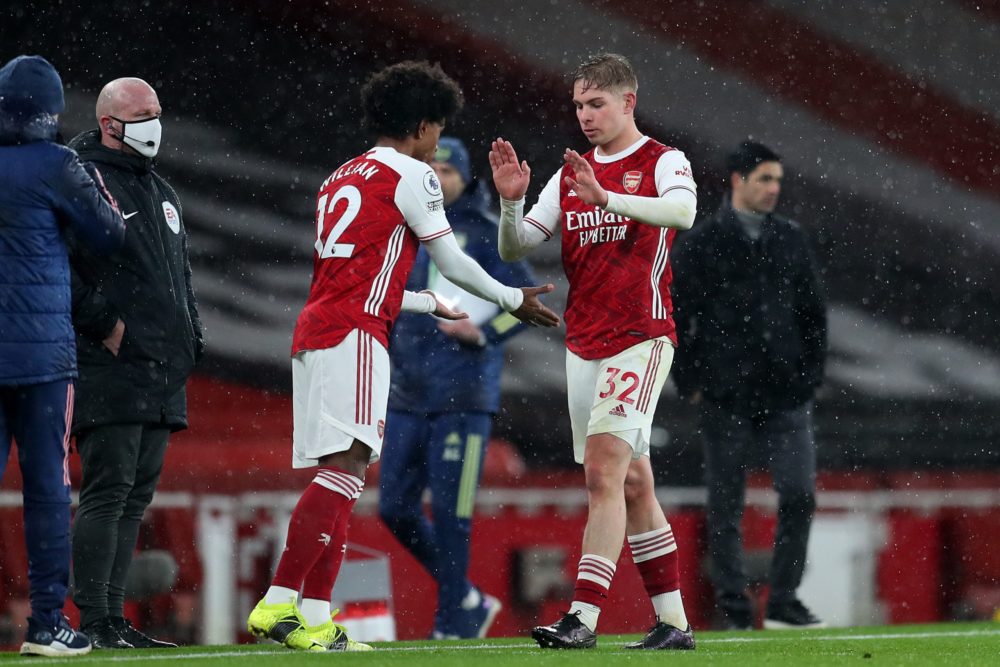
He shows how Mikel Arteta’s gameplan to beat the Leeds press worked so well, and then demonstrates how Arteta himself managed to somewhat screw it up with his choice of substitutions.

